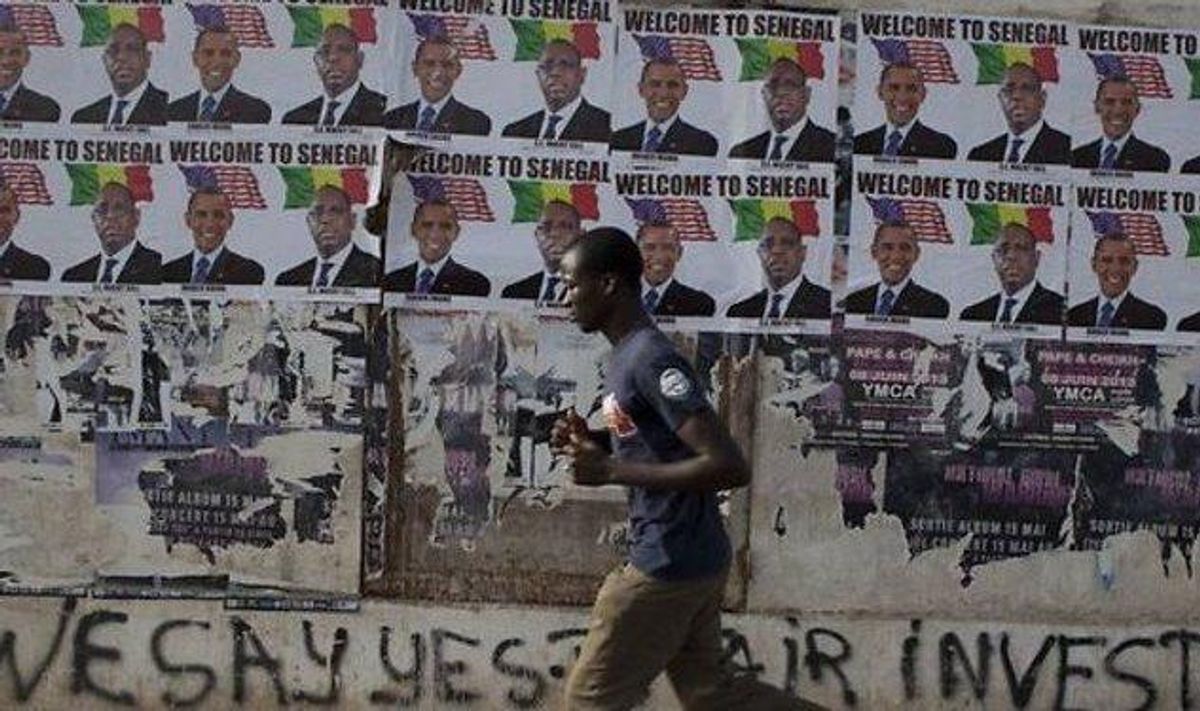News & Opinion
Obama Praises Equality Very Carefully In Senegal

Did President Obama make his point?
June 27 2013 4:18 PM EST
February 05 2015 9:27 PM EST
By continuing to use our site, you agree to our Private Policy and Terms of Use.

Answering a reporter's question about the Supreme Court and DOMA, President Obama, visiting Senegal, replied, "I think the Supreme Court ruling yesterday was not simply a victory for the LGBT community, it's a victory for American democracy."
He went on, "I believe at the root of who we are as a people, who we are as Americans is the basic precept that we are all equal under the law. We believe in basic fairness. And what I think yesterday's ruling signifies is one more step towards ensuring that those basic principles apply to everybody." And President Obama also expressed his awe over how Edie Windsor and Thea Spyer's love helped change an entire nation.
"When I spoke to Ms. Windsor -- 83 years old -- and I thought about the 40 years of her relationship and her partner, who is now passed, for her to live to see this day where that relationship was the vehicle whereby more people received their rights and are recognized as a testament to the love and commitment that they have made to each other, that was special. And that's just a microcosm of what it meant for families and their children all across America. So it was a proud day I think for America."
President Obama's positive response isn't really news. First, he already released a press statement celebrating DOMA's demise. Also, we all knew he approved. The Supreme Court itself said that the Executive's refusal to defend DOMA helped fuel the marriage movement's momentum. So, the words themselves were made newsworthy mostly for the setting: Dakar, Senegal, where you can be sentenced to five years in jail for "an improper or unnatural act with a person of the same sex."
The American President's response today was just one of the many ways Obama's administration has tried to support LGBT rights abroad -- thanks to Obama, American embassies now celebrate pride the world over, including in Senegal, and he joined then-Secretary of State Clinton in championing "LGBT rights as human rights" in 2011 -- but having him say it to a foreign, potentially homophobic audience makes it so much more meaningful.
But Obama also noted that he and Senegalese President Macky Sall hadn't discussed LGBT rights in Senegal. It didn't come up. And the President's qualifier, "American democracy," suggests that LGBT equality isn't necessarily right for all democracies, just the one in the States. Even if "American democracy" is the internatonal standard, not everyone models themselves after us; just look at Russia.
Sall definitely picked up on that, telling the audience, "These issues are all societal issues basically, and we cannot have a standard model which is applicable to all nations, all countries -- you said it, we all have different cultures."
"We have different religions. We have different traditions," said Sall. "And even in countries where this has been decriminalized and homosexual marriage is allowed, people don't share the same views." He also said that though Senegal is a "very tolerant country which does not discrimination" and is not "homophobic," they are "still not ready to decriminalize homosexuality... while we have respect for the rights of homosexuals -- but for the time being, we are still not ready to change the law." He then reiterated, "Senegal is a country of freedom and homosexuals are not being prosecuted, persecuted. But we must also show respect for the values and choices of the other Senegalese people."
While Obama's replies clearly didn't change Sall's mind, that doesn't mean they fell on deaf ears. Pew Research found that 78% of the Senegalese public "have confidence" in President Obama. Fifty-eight percent said they have a "very favorable" opinion of Obama and 23% said "favorable." Only 4% and 1% of the public said "unfavorable" and "very unfavorable." And a global survey last year found that though his international approval rating has slipped a bit, Mr. Obama's still quite popular, even in nations that, like Senegal, are made up of mostly Islamic people.
That said, it's safe to assume that somewhere out there, hopefully in Africa and elsewhere, someone who once misunderstood LGBT people, maybe even hated them, heard what the president said and will one day repeat his words: "I believe that everybody has to be treated equally. I don't believe in discrimination of any sort. That's my personal view."
Want more breaking equality news & trending entertainment stories?
Check out our NEW 24/7 streaming service: the Advocate Channel!
Download the Advocate Channel App for your mobile phone and your favorite streaming device!